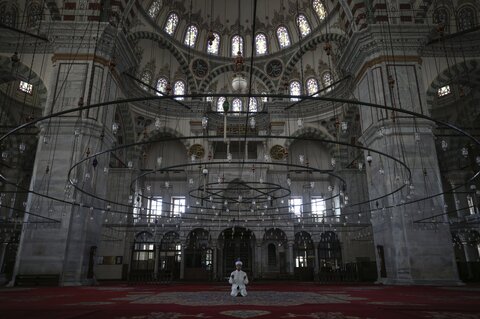Hawzah News Agency - The Muslim holy month of Ramadan arrived this year at the most challenging point of the COVID-19 pandemic.
The ninth month of the Islamic world's lunar calendar marks the occasion when Allah revealed the Quran to the Prophet Muhammad, while fasting is one of the five fundamental pillars in Islam.
A verse in the Holy Quran prescribes fasting for all mature and healthy Muslims as an act of worship, a chance to grow closer to Allah and a way to become more compassionate to those in need.
In this holy month, Muslims abstain from food, drink and smoking from dawn to sunset for a period ranging from 12 to 20 hours, based on the season and geographical location.
Two weeks ago, Ramadan began with millions of Muslims gearing up for fasting under the lockdown conditions brought on by the coronavirus pandemic.
This year’s Ramadan is like no other for 1.8 billion Muslims globally, with no nightly prayers at the mosques, no breaking fasts in the evenings with friends and families and no large congregational prayers planned to celebrate the end of the month on Eid, or Bayram.
As many Muslims usually increase their attendance at mosques during this holy month and congregate for longer prayers, these rituals have been canceled and moved to the home.
Plus, Muslims who were used to spending consecutive days and nights at mosques during the last 10 days of Ramadan (i’tikaf) for prayers, will not be able to do so this year.
Although cultural and religious practices are regularly observed throughout Ramadan, gatherings of families and friends who unite to break their fasts together after sunset are not permitted in many places due to the onus of social distancing.
Impact on health
Fasting is obligatory for all adult Muslims who are not acutely or chronically ill, traveling, elderly, pregnant, breastfeeding, diabetic or menstruating.
It is a deeply spiritual time for followers of the Islamic faith and many will choose to fast.
However, some people are particularly vulnerable to the coronavirus. They may choose not to fast if they are showing symptoms of COVID-19 or if they fear that refraining from food and drink may weaken their immune system. The elderly and the poor may be excused for this reason.
With the current burden placed on the world by COVID-19 and the precautions raised by the World Health Organization (WHO), especially the necessity for keeping the throat wet, there has been an ongoing debate by many scientific and public communities around the world whether or not adult Muslims should fast during the month of Ramadan this year.
Studies have been conducted on humans and animals that have shown the ability of fasting to improve the body's resistance to bacterial infections. At the very least, these studies showed no adverse effect of fasting on increasing the severity of the impact of COVID-19 on the immune system.

